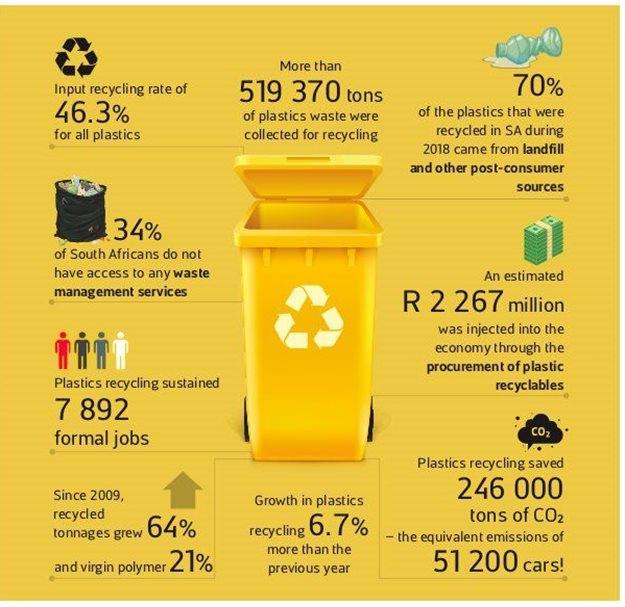Top stories



Marketing & MediaHow Spar is using localised marketing to redefine the urban retail experience
Karabo Ledwaba 1 day



More news





ESG & Sustainability
How South Africa’s conservation efforts can thrive with Indian partnership









“Despite facing major challenges last year, the plastics industry made important strides forward. Plastic bags manufacturers removed fillers to produce bags that are fully recyclable. In addition, 100%-certified recycled plastic material is now used to produce some carrier bags. This creates an end-market for recycled plastic products and helps to reduce waste to landfill. By ensuring that the products we create become part of a circular economy, we create a win-win situation for the environment and for the industry that employs 60,000 people,” explains Anton Hanekom, executive director at Plastics|SA.

Key findings of the 2018 Recycling Survey are:


In order to ensure that the value of plastics is repeatedly harvested and that a sustainable, growing circular economy is developed, Plastics|SA has made the following recommendations:
1. Improve South Africa’s waste infrastructure. Used plastics need to be collected and removed from the environment. An adequate waste management infrastructure (that is able to deal with recyclable as well as non-recyclable waste) must be developed and put in place at municipalities around the country.
2. Reduce contaminants in the waste stream. Plastics recycling can continue to grow through collaborative effort to reduce the contaminants in the incoming waste stream, e.g. compostable and biodegradable material.
3. Provide assistance to recyclers in terms of challenges within their recycling operations.
4. Develop alternatives for difficult-to-recycle plastics. There are certain materials and plastic products that are not economically viable to collect, transport or recycle. Solutions need to be developed for these difficult-to-recycle materials.
Designing plastic packaging and other products with recyclability in mind and gaining access to good quality recyclable materials before they end up in landfill, continue to be the top priorities that drive the future strategy of the plastics industry.
A South African Initiative to End Plastic Waste in the Environment was recently established. Representatives of the plastics and packaging industries, raw material suppliers, converters, brand owners, international fast-moving consumer goods companies, recyclers and environmental organisations are developing a workable, local plan that fits the South African context and our particular environmental, socio-political and economic realities.
“Recyclables are a valuable resource and should be removed from the solid waste stream before reaching landfill where they become contaminated and extraction costly. Similarly, stakeholders have to work together to manufacture locally, process efficiently and manage the end-of-life products so that they benefit the consumer, the industry and the planet,” Hanekom concludes.